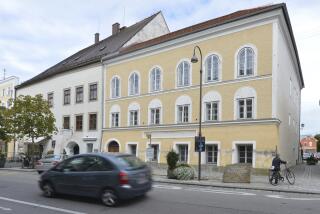Austrian Town of Hitler’s Birth Aims to Transform ‘the Burden’
BRAUNAU, Austria — The house where Adolf Hitler was born is an eyesore with peeling, yellow-brown paint, a disgrace occupied by disabled people who have nowhere else to go.
Hitler’s hometown is trying to transform the decrepit three-story building at 15 Salzburger Vorstadt into a “House of Responsibility” that would teach visitors about atrocities of the past and present in order to avert more.
Supporters of the project are still working out the details and haven’t begun to raise the estimated $3 million to $4 million it will cost, but Mayor Gerhard Skiba says they are determined to make something positive out of what he calls “the burden.”
“The city of Braunau’s intention is not to demonize the place but to show . . . all the events that happened during the Nazi era and to inform people of the cooperation by citizens of Austria in this murderous regime,” he said.
“Then we want to tell people that it should never happen again in a democratic country like Austria, and it should also be a sign of peace for the future.”
Hitler, who masterminded the 20th century’s worst genocide, was only 2 when his family moved from Braunau, about 35 miles north of Salzburg. Yet more than a century later, local people still call his birthplace “the Hitler house.”
It is actually a workshop where about 40 mentally and physically disabled Austrians make handicrafts that are sold in a ground-floor shop.
To Hitler, they would have been threats to the superiority of the Aryan race and deserving of extermination, along with gays, Gypsies and about 6 million Jews who were victims of the Holocaust.
The Hitler House has been home to the disabled people’s workshop for about 15 years, but the Austrian charity Life Aid is anxious to move out of a building that the owner won’t renovate.
Andreas Maislinger, who is leading the campaign to make it a House of Responsibility, says supporters must first find the disabled people a better place and then find the money for the project.
The mayor hopes to obtain funding from the federal, provincial and city governments to buy the privately owned building.
But Maislinger doesn’t want tax dollars. He is determined to raise the money from private sources to free the project, as much as possible, from politics.
“In Austria, the whole discussion about the past is used as an instrument of politics--always,” Maislinger said. “And we are not interested in that. We would like to have an open discussion.”
Hitler was born April 20, 1889, in what was then an isolated town on the Austro-Hungarian border with Germany. His parents rented an apartment, probably on the first floor just above a pub called the Stag, said Florian Kotanko, a high school principal who heads Braunau’s Contemporary History Assn.
Hitler’s father, Alois, was a customs officer at the border post that his son’s troops would storm through to annex Austria in 1938.
The black iron grille above the front door of the birthplace still bears the initials MB for Martin Bormann, the Fuehrer’s ruthless right-hand man, who had the home turned into an art gallery to honor Hitler.
German troops tried to blow up the building as Braunau fell to the Allies on May 2, 1945, but American soldiers stopped them, Kotanko said.
Skiba took office in 1989, just weeks before the 100th anniversary of Hitler’s birth, and knowing that journalists and neo-Nazis would descend on his city, the mayor erected a memorial stone in front of the Hitler house. The death threats started immediately but eventually faded away, he said.
But the memorial remained. It is a piece of granite from Mauthausen, the most notorious of Austria’s Nazi concentration camps, where about 200,000 Jews and other prisoners were murdered or worked to death in the granite quarry.
It bears the inscription “For Peace, Freedom and Democracy. No more Fascism. Millions of dead exhort us.”
Few neo-Nazis make pilgrimages to Hitler’s birthplace anymore, Skiba said, but he receives reminders of Hitler’s legacy each year on the anniversary of the Fuehrer’s birth.
“I get birthday greetings from all over the world--including the United States,” Skiba said. “Some give names or they are anonymous--or maybe crazy.”
More to Read
Sign up for Essential California
The most important California stories and recommendations in your inbox every morning.
You may occasionally receive promotional content from the Los Angeles Times.










